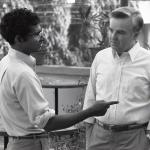A Final Word (Hopefully) about the McDermott Article and My Alleged “Meliorism”
If you have not read my two previous (and recent) blog posts about theologian Gerald McDermott’s article “The Emerging Divide in Evangelical Theology” (Journal of the Evangelical Theological Society 56:2 [June 2013]) this third one will not make much sense to you. I urge you to read those first, if not the article itself.
Since the second post, I have received many e-mails about the article and about my objections to it. Some friends (and others) think I over reacted to McDermott’s characterizations of my theology. Others were more supportive and sympathized with my reaction. Others simply had points of information or opinion to share. All have been valuable and helpful.
Most importantly, McDermott himself e-mailed me and offered an extremely helpful clarification that sheds light on the whole matter. While I still object to some statements he made in the article (I quoted those in my previous posts) and think them blatantly false (e.g., about our alleged belief that doctrine must be amended due to the historical conditioning of Scripture), the whole picture is now coming into clearer light—light that causes me to reconsider where our differences really lie.
I assumed that McDermott and I are on the same general “page,” so to speak, about theology’s sources. I believe ONLY Scripture is supernaturally inspired and infallible. I take that to be THE standard evangelical Protestant view. Tradition is also a source and norm of Christian theology, but it is a “normed norm” while Scripture is our “norming norm.”
However, now I realize (as I did not before) that McDermott, an Anglican priest, believes in “one source”—Scripture and tradition together (according to his recent e-mail to me).
Here is how McDermott expressed it in his article (which he helpfully pointed out to me):
“The lesson evangelicals should have learned is that sola scriptura is necessary but not sufficient for maintaining theological orthodoxy. Only a ‘single-source’ view of tradition in which hermeneutical authority is given to the mutual interplay of Scripture and orthodox community—the method that the church practiced for most of Christian history–can protect evangelical theology from going the way of all flesh, to liberal Protestantism.”
So, apparently, McDermott believes that there is some extra-biblical deposit of tradition that is, for all practical purposes, equal with Scripture in terms of inspiration and authority for Christian belief. I do not. Neither, I judge, have most evangelicals. Most evangelicals, I included, respect tradition, but the standard evangelical view of tradition is that everything outside of Scripture is subject to Scripture’s authority.
Interestingly, so it seems to me, by defending that view of Scripture and tradition McDermott is breaking from the evangelical tradition which is to defend sola Scriptura. And, to my way of thinking, anyway, that leads right toward Roman Catholicism. Why? Because without an authoritative magisterium such as the Vatican, and without an infallible pope, it’s difficult if not impossible to say exactly what counts as incorrigible, authoritative tradition.
Also, I find it interesting to contemplate the fact that it is those Protestant traditions that have been most creedal that have succumbed to liberal theology. “Bible only” traditions, non-creedal ones, have, overall, not succumbed to liberal theology as quickly or decisively as have the magisterial, creedal Protestant churches. Apparently creedalism is no guarantee or guard against liberal theology.
Also, I question the logic of the claim that sola Scriptura is necessary but not sufficient. The whole point of sola Scriptura, its very meaning, is that Scripture is sufficient—as the only final court of appeal, so to speak, when there is a conflict over doctrine. To say it is not sufficient is to deny it. That is not to dismiss tradition as a guide; it should be—for every right thinking Christian. But to elevate it to a level of authority equal with Scripture (which is what functionally happens when it is made the necessary interpretive “lens” for reading Scripture and when it is made a criterion equal with Scripture for settling doctrinal controversies) is to deny sola Scriptura.
What McDermott calls my “meliorism” and argues is dangerous because it leads down a slippery slope toward a kind of “anything goes” approach to theology is simply my attempt to make sola or prima Scriptura explicit and practical. SOME evangelicals, I believe, have been treating SOME extra-biblical tradition (e.g., the “ancient Christian consensus”) as sacrosanct, as equal with Scripture itself. That shows in how they react when someone, whether it be Clark Pinnock or N. T. Wright, dares to question some part of that received tradition—even in light of fresh and faithful biblical research and interpretation.
I argue that the “growing divide” in evangelical theology is between those of us who remain faithful to the Protestant sola Scriptura principle and actually practice that and those who, explicitly or implicitly, place some extra-biblical deposit of tradition on a plane equal with Scripture.
I would even go so far as to question whether anyone who does embrace a two-sources of truth approach (which McDermott calls “one source”) is really fully evangelical in terms of fitting the ideal type of evangelicalism which, as Noll and Bebbington have argued, historically, theologically, and sociologically places Scripture above every other source for determining faith and practice.
I’m not the pope of evangelicalism and don’t want to be. I’m simply talking here as a scholar of the evangelical movement and its form of life. Sola Scriptura has always been held very high by evangelicals. And those of us in the free church, baptistic wing of evangelicalism especially do that. That is, it is a favorite emphasis of ours. I welcome into and within evangelicalism those who wish to place orthodoxy, tradition, on a par with Scripture but I regard them as the innovators, not those of us who hold to sola Scriptura and regard tradition as a secondary guide only.
So, when McDermott calls me a “meliorist” and implies that it is I who am moving away from historic evangelicalism, I have to call that into question. I believe I am simply holding to and practicing what all evangelicals have claimed to believe and practice and baptists have especially valued and attempted to practice.
Again, I ask, isn’t McDermott’s complaint about me REALLY that I am baptist? I think so. He should admit it and stop calling me a “meliorist” which, in his description of it, anyway, appears to be a slippery slope toward liberal theology. It isn’t. Again, I ask, which Protestant churches have been “slip sliding away” (to quote Paul Simon) toward and into liberal theology? Mostly creedal ones.
Two footnotes.
1. McDermott and I disagree about “liberal theology.” I regard it (with Claude Welch of Yale University) as “maximal acknowledgment of the claims of modernity” in theology. In other words, it is not any and every acknowledgment of development of doctrine. It is development of doctrine with modernity as authoritative source and norm. I think this is the standard definition of liberal theology. I don’t even recognize any other one as valid; others, I believe, are simply ad hoc meanings of “liberal.”
2. McDermott and I disagree about Luther’s attitude toward tradition. He regards Luther as a creedalist who held extra-biblical, orthodox doctrines as necessary and (my word here) incorrigible. I think Luther was inconsistent in this. When he was facing toward the Roman Catholic Church he relativized tradition, leaving everything extra-biblical as at least theoretically open to correction by the Bible itself. After all, when Luther stood before the emperor at Worms he appealed to Scripture and reason, not tradition (of course). He said that he would not be swayed by appeal to the creeds and councils as they often contradicted themselves. The Catholic church and its theologians then did not make fine distinctions between the great classic doctrines carved out at Nicea, Constantinople and Chalcedon and their medieval view of salvation. They saw Luther as attacking ALL of tradition when he broke with the medieval (and some would say ancient) Catholic doctrine of salvation. I still have not found any source before Luther teaching simul justus et peccator. Luther drew that from Scripture and threw it against the whole of prior Christian doctrine about salvation. But when he was facing the radical reformers he considered “false brethren,” Luther appealed to tradition in a way that, in my view, contradicted his own approach to Scripture as the sole supreme source of doctrine. They, especially the Anabaptists, were the ones who carried Luther’s Scripture principle forward consistently. They were the ones who stood up to Luther (and Zwingli) and said, about baptism, for example, unless they could be convinced by Scripture and reason their consciences were held captive. There they stood; they could do no other. And Zwingli and other magisterial Protestants fully supported their being tortured and killed for that. Luther did not advocate the murder of heretics, but neither did he speak out against it as he should have (knowing that he was one, too—from the Catholic perspective). (Now—please don’t throw Luther quotes at me. One can find almost anything in Luther if they look hard enough. I have a massive volume entitled What Luther Said that contains thousands of Luther quotes many of which contract each other.)
McDermott’s quote above raises this question: Did Luther and/or the Anabaptists pave the way toward liberal theology? Conservative Catholics would say yes. Perhaps he would say yes about the Anabaptists. But they certainly were not “meliorists.” They were “Scripture above tradition” Christians. And to blame them for the later rise of liberal theology seems ridiculous. It arose, after all, primarily among magisterial Protestants in Europe. Schleiermacher, after all, was a minister of the state church of Prussia. Many of us McDermott labels “meliorists” and blames for a mythical slide of evangelical theology into liberal theology are really simply baptists who, with the radical Reformers, place Scripture above tradition without throwing everything of tradition aside completely. Many of the Anabaptists also held portions of tradition in high regard—as a secondary source and norm, a guide, but not as incorrigible and necessary for understanding Scripture.















